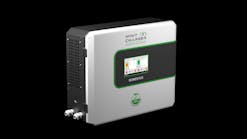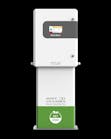Exro Technologies Inc. and Lithium Werks Announce Collaboration to Improve Lithium Battery Performance Under Variable Conditions
Energy management company Exro Technologies and battery and portable power solutions group Lithium Werks have agreed to collaborate to improve the way batteries are controlled under variable conditions.
“We will combine our technologies to develop flexible battery voltage input and output solutions for applications ranging from large scale energy storage for the grid, to everyday consumer goods,” said Mark Godsy, CEO of Exro Technologies.
Exro’s software technology allows for constant monitoring and manipulation of energy inflows and outflows, at rates of up to 100k manipulations per second. The goal is total control of the flow of energy, in effect allowing better, more balanced storage of energy, especially under changing conditions, while also making battery banks of any size inherently electrically safe. Exro’s technology is also designed to make it possible to “swarm” batteries by getting them to work in concert with one another to better manage and load balance inflows and outflows of energy under varying conditions.
“This strategic partnership with Exro Technologies comes at a time of soaring demand for our Lithium Werks’ NanoPhosphate lithium ion battery technology,” said T. Joseph Fisher III, Lithium Werks CEO and co-founder. “Our high-powered batteries are both smaller and lighter as well as safer and more durable than those offered by our competitors. By combining this with Exro’s intelligent technology, we are building a strong foundation for a partnership capable of serving the cutting-edge requirements of our customers in the new applications market.”
Some of the benefits that can be realized with Exro and Lithium Werks combined technology include:
- The ability to reconfigure battery assemblies so they can be successfully charged or discharged at different voltages, resulting in system efficiency gains
- Eliminates need for a traditional inverter (normally used to handle grid storage or load balancing)
- The ability to expand energy storage by simply adding more batteries, without having to add additional control or power conditioning equipment
- Redundancy for fault tolerance, as failed batteries will not bring down the system
- Easier battery balancing with no battery-to-battery leakage
- The ability to swap batteries while in operation
- The ability to change dynamically how much capacity is devoted to grid storage versus load balancing of a given grid bank at any given time
- The ability to control energy output and input for any given battery at any given point in time




